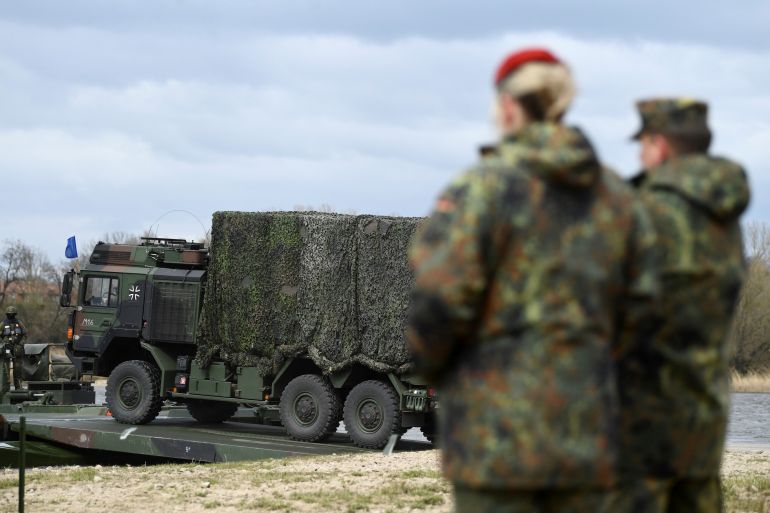German parties reach deal on $107bn defence spending boost
The deal will allow Berlin to achieve NATO’s target of spending 2 percent of GDP on defence ‘on a multi-year average’.

Germany’s governing coalition and the main opposition party have reached a deal to move ahead with a significant boost in defence spending that Chancellor Olaf Scholz announced three months ago.
Scholz welcomed the agreement on Monday, saying that “it was the right answer to the turning point that started with Russia’s attack on Ukraine“.
Keep reading
list of 1 itemThe German leader said three days after Russia invaded Ukraine on February 24 that Germany would commit 100 billion euros ($107bn) to a special fund for its military and raise its defence spending above 2 percent of gross domestic product (GDP), a measure on which it had long lagged.
“The German Bundeswehr will be strengthened,” Scholz said at a trade fair in Hannover on Monday, the DPA news agency reported. “It will be in a position to fulfil its defence mission better than ever, and it will be able to make its contribution in NATO so that we can defend ourselves any time against attacks from outside.”
“This will contribute to the security of Germany and Europe increasing,” Scholz added. “It is the right answer to the turning point that started with Russia’s attack on Ukraine.”
Scholz wanted to anchor the special fund in the constitution. That requires a two-thirds majority in both houses of parliament, meaning that he needed support from the centre-right opposition Union bloc.
Talks became mired in details, but the two sides reached an agreement on Sunday night that clears the way to bring the fund to parliament.
Among other things, funding for cyber-defence and support for partner countries will come from Germany’s regular budget, not the special fund as some in the governing coalition had proposed.
The Union bloc wanted assurances that the fund will be used exclusively for the German military, the Bundeswehr.
NATO’s spending target
A statement circulated by the finance ministry confirming Sunday’s agreement said NATO’s so-called 2 percent target will be achieved “on a multi-year average”.
The leader of Scholz’s SPD, Saskia Esken, cited fluctuations in the procurement of armaments as the reason for exact compliance with the 2 percent NATO target not being possible every year.
“If you order major equipment today, you won’t get it for three or four years,” Esken said in comments published in Sunday’s edition of the Frankfurter Allgemeine Zeitung. “That means that possibly the sums are not so high in the first two years, and then comes a year in which a great deal becomes necessary.”
NATO countries slashed their military budgets in the 1990s after the Cold War, but they were spurred back into action when Russia annexed Ukraine’s Crimean Peninsula in 2014.
The allies pledged to halt the cuts and move towards spending 2 percent of GDP by 2024.
Germany drew criticism, particularly from the United States under former President Donald Trump, for falling short of that target.